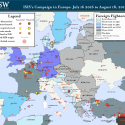 |
 |
ISIS's Campaign in Europe: July 16-August 18, 2016

ISIS’s network in Europe accelerated small scale attacks in July and August 2015 as part of a deliberate transition to the next phase of its global war between Muslim and non-Muslims. The recent death of ISIS’s spokesman, Abu Mohammed al-Adnani, the primary architect of ISIS’s global campaign, will likely not suppress this terror campaign. On the contrary, Adnani’s death may provoke additional attacks in the region intended to punish the West. ISIS-linked militants carried out numerous attacks since July 5 2016 in Europe, using diverse weapons such as a truck, a bomb, and knives and machetes. Political responses to these attacks, such as new restrictions on Muslim ways of dress and places of worship, support ISIS’s goal to polarize the West and encourage increased disillusionment among Muslim communities. ISIS focused its attacks during this period on Germany, the center of Europe where ISIS can exploit political tension over refugees and accelerate its polarization and destabilization campaign. The trend of small-scale attacks suggests that ISIS instructed individual attackers and handlers to conduct semi-autonomous attacks rather than await instruction to coordinate larger spectacular attacks. The increase in rapid claims of these attacks by ISIS’s Amaq News Agency suggests that ISIS is also instructing attackers and handlers on how to communicate their operational plans beforehand, a sign of control and adaptation. Larger spectacular attacks remain a threat to Europe despite this trend.